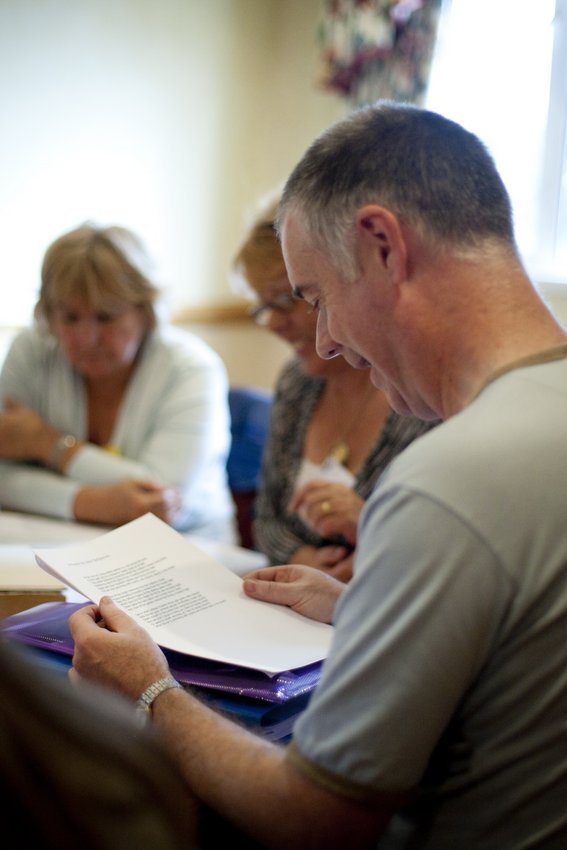
Guest post by Eleanor McCann, The Reader project
Whenever I arrived to read with patients at the psychiatric hospital, David was always alone. I approached him a few times but the weeks went by and he seemed unreachable, saying nothing and making no eye contact. One evening, I came on to the ward to find him lying on a sofa with the lights off, his hood up and his earphones in. All the barriers were up. I handed him a poem and, to my amazement, he took his earphones out, his hood down and said: “Can you turn on the light?”
The poem I gave to David was Release, by R.S. Gwynn. It goes:
Slow for the sake of flowers as they turn
Toward sunlight, graceful as a line of sail
Coming into the wind. Slow for the mill-
Wheel’s heft and plummet, for the chug and churn
Of water as it gathers, for the frail
Half-life of spraylets as they toss and spill.
For all that lags and eases, all that shows
The winding-downward and diminished scale
Of days declining to a twilit chill,
Breathe quietly, release into repose:
Be still.
I think the poem’s stillness broke David’s silence. After that, he joined the reading group on his ward, where we enjoyed short stories, such as Saki’s The Lumber Room and Doris Lessing’s Through the Tunnel; extracts from novels including Jane Eyre and The Old Man and the Sea and poems old and new. We read Release with the group and David said he loved the last two lines, especially. He said: “Poems can move you even though you’re sat still. Probably you actually have to be still like it says there. It’s different from feeling manic.”

David has instructed me to always approach him: “Come and knock on my door, even when I’m in the dark and I’ve got my back to you.” This is the essence of why the reading project exists: to knock on doors, bringing light and lightness through reading.
David’s group is one of about 280 Get Into Reading (GIR) groups across the UK. GIR brings people together through weekly read aloud groups, where people can choose to read and are invited to give personal responses. We have groups in locations such as care homes, libraries, prisons, mental health drop-in centres, community centres, schools, hostels, refugee centres and workplaces. Sessions are an opportunity for people of all ages, backgrounds and abilities to engage with reading for pleasure. The work aims to bring about, what we call, a Reading Revolution. This means we want to make literature available to those most in need in our society, as a way of fostering individual wellbeing and social cohesion.
![BUPA care home 1[1]](http://thesocialissue.com/wp-content/uploads/2012/02/BUPA-care-home-112.jpg)
I work specifically within mental health settings so my groups are in a variety of health-care environments: older people’s care homes; psychiatric units; secure hospitals and addictions services. This type of work is an innovation. The medical director of Mersey Care NHS Trust has said that “Get Into Reading is one of the biggest developments in mental health practice in the last 10 years.” We believe our model is a pioneering way of using creative partnership to deliver meaningful activity to patients. Reading should not be merely an additional intervention; I would identify it as an integral part of the care provision for mental health patients.
My grandmother was an occupational therapist in the 1960s and 70s, and she remembers reading aloud with some of the people with whom she came into contact. It’s just that we are only now really realising the full extent of the potential that literature has to help people- and that this can amount to the transformation of lives and communities.
We have recently carried out some evaluation so have statistics to substantiate this. 54 reading group attendees, both inpatients and outpatients, filled in a questionnaire. The results showed very encouraging responses to their experience of the reading groups.
There were some overwhelmingly positive results, for example, 94% of people agreed with the statement ‘The reading group has given me a chance to take part in interesting discussions’ – but the results form our research are particularly relevant in the context of mental health. In response to the statement “reading has improved my mood”, 78% agreed, 18% neither agreed nor disagreed and just 4% disagreed. And in reaction to the statement that “in the group I’m able to be myself”, 79% agreed, 19% neither agreed nor disagreed and just 2% disagreed. Our research showed 85% agreed with the comment “I’m more able to relax” while 11% neither agreed nor disagreed and 5% disagreed.
I find my work extremely rewarding, primarily because of qualitative, individualised stories like David’s, but this is verified by a growing evidence base, pointing to cost-effective, lasting benefits for our readers.
* Eleanor McCann is a project worker with Mersey Care Reads, a collaboration between The Reader Organisation and Mersey Care NHS Trust. The organisation was a runner-up in last year’s Guardian Public Service Award. Eleanor’s work involves delivering weekly reading groups in mental health settings across Merseyside. She is also studying for a masters in Reading in Practice, a course combining literature and health science, at the University of Liverpool and is co-editor of The Reader magazine. Eleanor can be contacted at eleanormccann@thereader.org.uk

Great post – I wonder if you’ve come across Elizabeth Jennings – I used some of her poems in some of my work in Mental Health – particularly we did a compare and contrast between ‘The Interrogator’ (who I read to be a psychiatrist) and ‘Night Sister’ – Jennings spent some time in psychiatric hospitals and wrote about her experiences. It’s really good stuff.
Hi thanks for the comment (and mention!), Jennings rings a (very) distant student bell but I suspect Eleanor, who wrote this lovely piece, will be much more familiar with her work. Saba
Hello, thanks for your comment and recommendation. I have read a number of Jennings’ poems with my groups, although I didn’t realise she had been in hospital herself so that’s interesting.
I’d say the poems of hers which have gone down well are ‘A Return’, ‘Autumn’ and ‘Into the Hour’.
I haven’t come across those two poems you mention, though, so I’ll be sure to check them out.
Thanks,
Eleanor